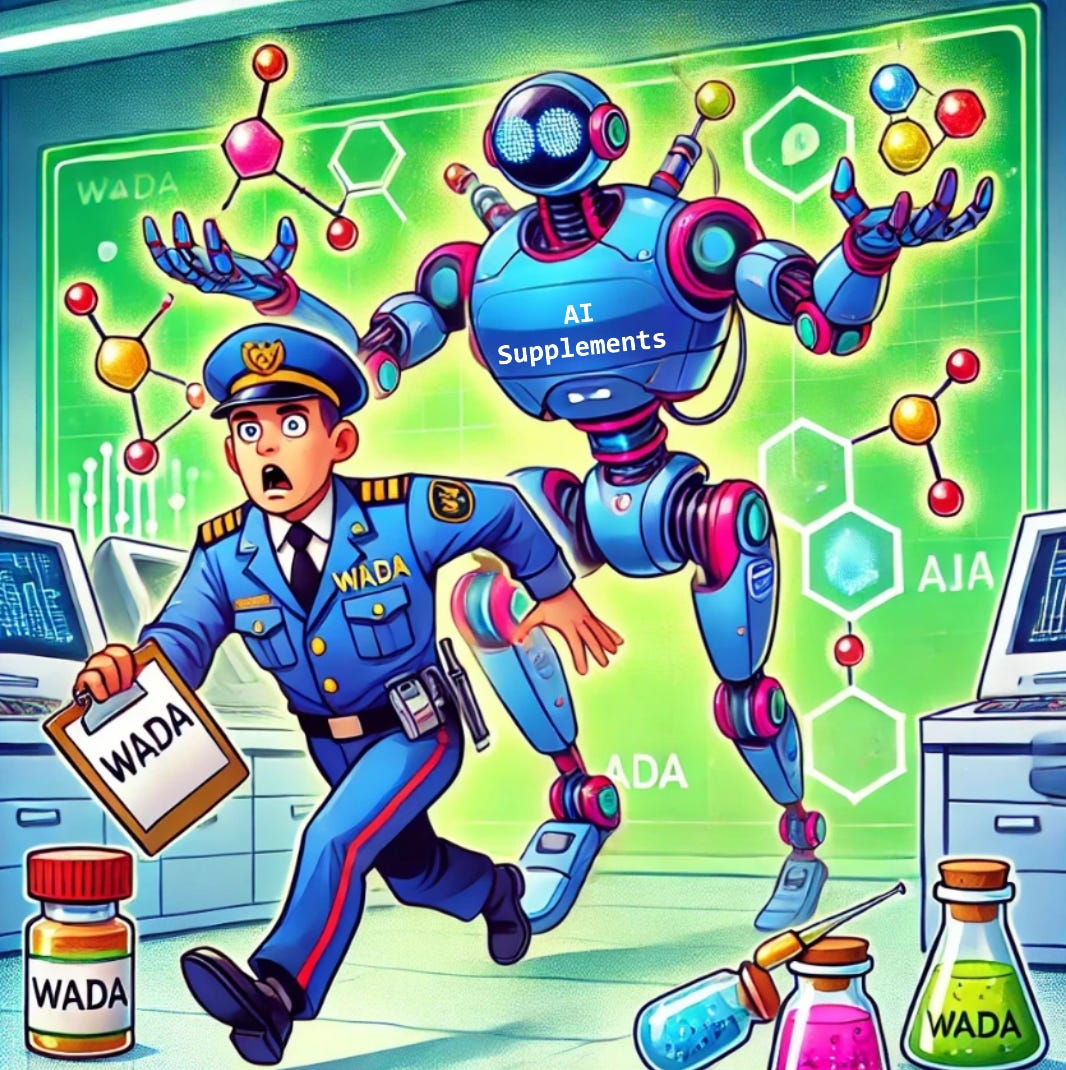Will AI Discover the New Super Supplement?
And should it be banned from sports?
Welcome! For those who are new here – I’m Arne, a passionate cyclist and engineer with an interest in AI. I explore how technology, particularly artificial intelligence, is transforming sports – or not – and what it means for athletes, coaches and sport enthusiasts. Be sure to check the social channel as well:
Athletes are always looking for something, something to make us healthier, stronger, fitter more energized. 99% of this comes and should come from getting the basics right: eat, sleep, train. Nevertheless, getting a bit of ‘aid’ through supplementing our diet is tempting. But how effective are existing supplements? And can we expect any new supplements to be developed, or maybe even be "AI developed” (OoOOooh!)
Before jumping into this rabbit hole, let’s do some scope setting and definitions. A dietary supplement is a manufactured product intended to supplement a person's diet by taking a pill, capsule, tablet, powder, or liquid (Wikipedia). This definition is still extremely wide. Following the categorization by Garthe and Maugnan makes things slightly easier to comprehend:

Most of us will link supplements to the Medical Supplements and Ergogenic groups. To me these are also the most interesting, the others groups seem to be more part of ‘common’ diet. In theory, you can create these in your own kitchen. That is not the case for the medical and ergogenic groups – assuming there is no Breaking Bad Style creatine cooks among you. So let’s focus on these the two groups!
The actual need for supplements
First of all, supplements should be the last thing you focus on in your diet. I love the Athlete’s food pyramid. It shows what is actually important in your diet. Make sure you have a good grip on tier 1 to 4 before losing yourself in supplementation. No multivitamin is going to justify eating crap – excuse me – for the whole day. This does not mean, that supplementation is unimportant. It’s widely accepted that supplementing with vitamin D during winter is beneficial and that vegans or vegetarians should consider adding iron and B12 to their diet.

If you read the IOC consensus statement: dietary supplements and the high-performance athlete (awesome document (!), I really recommend you take a look when you are into this subject), you will find that in addition to vitamin D and iron, especially omega-3 has many positive effects on general health and training adaptation. To a lesser degree vitamin C and zinc can support your immune system. But apart from these three, scientific evidence for other medical supplements is weak.
Looking at the performance-enhancing supplements, there is, of course, caffeine (hello coffee lovers!). Consuming 3–6 mg/kg of caffeine about 1 hour before your race will result in a performance gain of multiple percents. It was even on WADA’s list of banned substances between 1984-2004. In addition to caffeine, creatine, nitrate (beet juice), beta alanine and sodium bicarbonate are proven to be effective. Sodium bicarbonate and nitrate can have a direct positive effect (same day) on your performance, creatine and beta alanine require a loading period of multiple days and weeks respectively. However, none of these will turn Johnny from the local cycling club into Tadej Pogačar. We are talking marginal gains here.
New super supplements?
So there is no supplement that is going to make you fly? One that’s legal, sorry to disappoint, no. At least, not yet, because AI might change this! There are already companies that have specialized in the use of AI to discover new ingredients and optimize supplements for an individual. Nuritas, for example, is actively working with AI to discover new ingredients for their supplements. Their product PeptiStrong (#nospon) is developed with the help of AI. PeptiStrong is a peptide-based food supplement. You can interpret peptides as very tiny, simple proteins. Nuritas developed PeptiStrong by mining trillions of possibilities, identifying novel bioactive peptides to create new ingredients. Clinical studies show that it outperforms animal proteins like whey, significantly improving strength recovery and restoration, reducing fatigue, and positively modulating markers related to muscle homeostasis (see here and here). Interesting stuff!
And this is only the beginning. Some of you might have heard that the 2024 Nobel Prize for Chemistry was awarded for an AI model that predicts protein structures and designs them from scratch. This is a game changer in drug discovery and personalized medicine. It means that we cannot only use AI to sift through huge amounts of existing proteins and ingredients, but we will even be able to build and design new proteins ourselves.
WADA are you reading this?
Although the above might still feel like science fiction, super ingredients are likely to be developed. These developments will likely face resistance, and their application remains debatable. Will AI-designed supplements cross the line between legal supplementation and doping? And what about maintaining a level playing field when access to these AI-designed supplements is dictated by money? I hope WADA is reading this.



